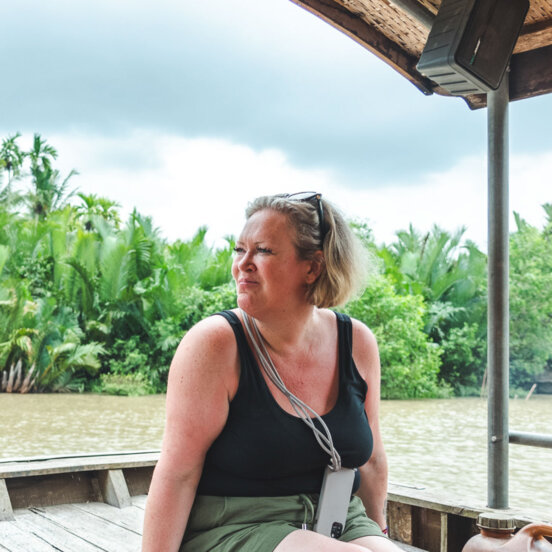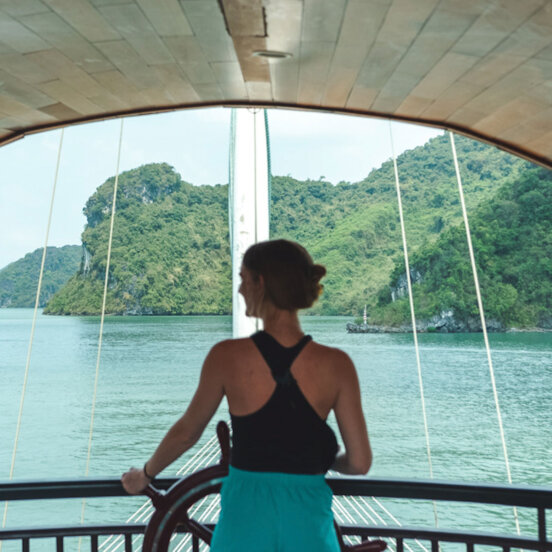My ritual of phone-free Sundays has opened up a world of solo adventures

A decade ago, I found myself in my therapist’s office discussing stress, as you do if you’re a regular in a therapist’s office. One of the things she astutely pointed out was that there is no off button for someone working in a creative field, much as there is no traditional weekend for anyone who works as a freelancer.
I work in the entertainment industry, primarily as an actor, producer and podcaster. I also make films, which is exceptionally time-consuming, and without the traditional boundaries of a 9-to-5 job, my work/life balance tends to suffer.

Most people don’t check their work email on the weekend
She asked me what I could do to give myself a day with no guilt over not pursuing work or art? I shrugged. No clue. She suggested a screen-free Sunday.
When I laughed, she reminded me that’s what most of the world does. Most people don’t obsessively check their work email on the weekend – and it would be okay if I didn’t either. Everything in there could wait.
It was hard at first. Like my fellow ambitious New Yorkers, I’m an obsessive go-getter and overachiever. But as a conscientious student, I was given a homework assignment from my therapist that I had to complete.

My screen-free Sundays have helped me relax
So, I started telling my bosses “I don’t work on Sundays.” There was often a pause and then a resounding “good for you.” Ten years later, this is still the case when I tell collaborators that I won’t Zoom on a Sunday and I won’t read their script on my weekend, either.
It’s tough, but telling people I’m screen-free on Sundays has created a boundary they seem to respect. After all, our brains need time off from our inbox.
Sure, I have to work the odd Sunday now and again or check my messages for a specific piece of information. But over time, my screen-free Sundays have helped me relax. They’ve helped me unwind and reset for the new week ahead. They’ve helped me sleep. They’ve helped my overall wellbeing and happiness. And they’ve helped me discover new places.

I have to continually check in with myself
Now, what to do with all that spare time I’d created? After all, how much fun is it to go to the Metropolitan Museum of Art again? Especially when, like me, you’ve lived in the same place for 20 years. Finding the new stuff, the hidden things I’ve never done before, that’s been the tricky part.
When I started setting out, my only requirement was to have a Sunday adventure that took me out of my apartment. Now that I have a decade of Sundays under my belt, I have to continually check in with myself, asking some key questions.
They are: what do I need today? Do I need nature, fresh air, a quiet escape? How can I expand my mind, while giving it a rest from the million little work and life to-dos running around my head?

As a New Yorker, I have miles of subway track to explore
I count myself lucky because, as a New Yorker, I have access to five boroughs via 650 miles of subway track, as well as two commuter train stations taking me north to parts of New York State or west to New Jersey.
Recently, a newsletter profiled Katonah – a small country town about 90 minutes north of the city and accessible by train. Having never been there before – and having zero reasons not to go – I got myself to Grand Central, and off I went.
It was raining and misty when I got off the train, a typical moody and mysterious November day. The atmosphere was damp enough to bring back the curls to my wavy hair.

A small day trip can refresh your perspective
Yet it wasn’t the smell that got me, it was the quiet. The sort of lush silence that hangs over little hamlets on weekends, imbued with a certain sacred restfulness.
The immediate village surrounding the train station was charming, as many of these old New York towns seem to be: small shops with swaying wooden signs announcing bakeries, bookstores and mom-and-pop pizzerias.
There’s a lot of research behind the positive benefits of big travel, but a small day trip can refresh your perspective, too. According to Forbes: “A change of scenery wakes up your brain and takes it off autopilot. You have to think about small things when you’re in an unfamiliar place, which is entirely the point. Learning a few words of a different language, taking a walking tour, or even something as simple as trying a new food can get those neurons firing.”

These small trips created space for bigger adventures
My time in the country town did just that. I browsed a tiny art museum with illustrations from a prolific watercolourist whose work I didn’t know. I ate a delicious brie, apple and honey toast that I’ll never stop thinking about. And I picked up some organic soap that smelt like pumpkin from the General Store.
Safe in my own company, these small trips have given me space to start planning bigger adventures. In the last 10 years, I’ve had micro adventures exploring lesser-known museums. I’ve taken selfies in old estate gardens and explored trails in local parks I didn’t know existed. I had French scrambled eggs while brunching solo at West Village hotspot Buvette and made new friends on the dance floor of outdoor festivals. I’ve gotten impossibly lost on solo hikes. But still, through it all, I ended up finding my way.
That’s the thing about solo adventures: they might seem scary, you might be uncomfortable and you might get lost. Sometimes doubt creeps in. But the more you do it, the more you learn to trust your own company. And once you’ve tackled the parks and museums in your hometown, you start thinking about what else might be out there. After all, there’s a whole future of new Sundays just waiting for you – and a new whole world out there, too.
Jeanette Bonner is the host of the #single podcast. She recently travelled to Peru with Flash Pack in search of real-life connections and interviewed Flash Pack founder Lee Thompson on why he set up an adventure travel company for people in their 30s and 40s.
Got a story or adventure that could inspire a solo traveller like you? Tag @flashpack on social or email [email protected] to be featured.
Images: Courtesy of Jeanette Bonner










